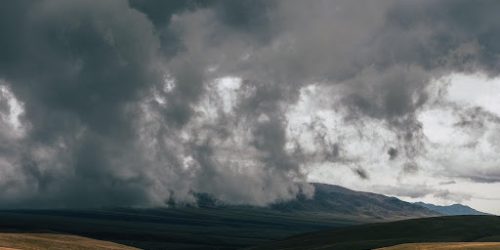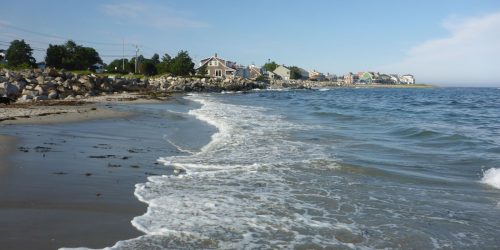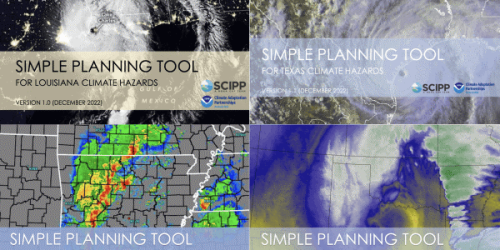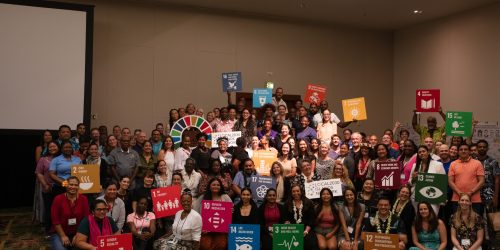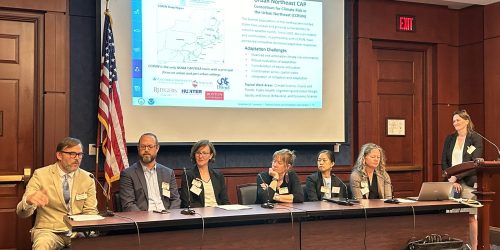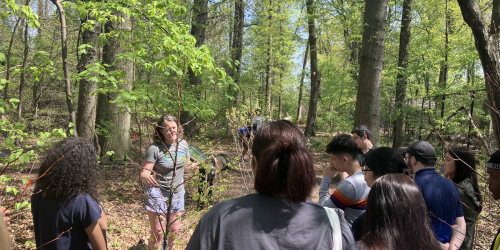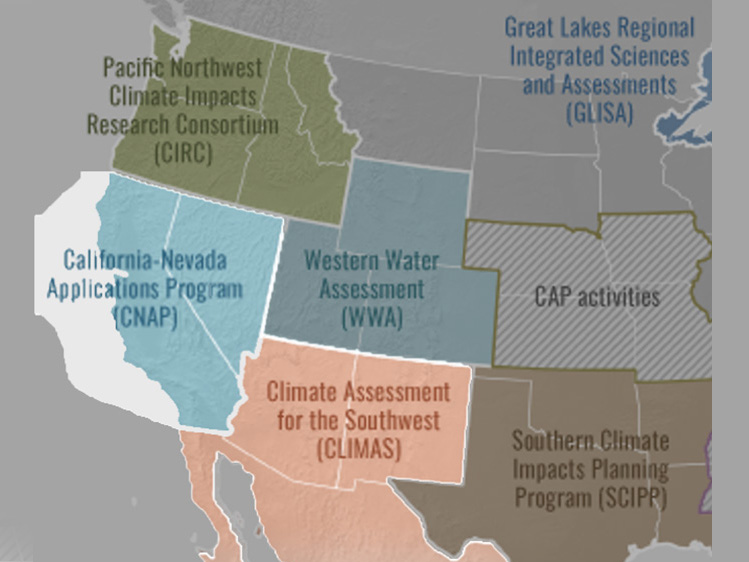
CPO’s Climate Adaptation Partnerships program, formerly the Regional Integrated Sciences and Assessments (RISA) program, is announcing two new 5-year awards for CAP/RISA teams in continuing regions in Fiscal Year 2022 (FY22). The awards will advance equitable adaptation in the West and Southwest regions through sustained regional research and community engagement. CAP/RISA teams focus on multiple climate and society issues, and develop a set of interconnected projects that build the capacity of regional partners to act on those issues.
In addition to their core awards, CAP/RISA is funding small grant components to better connect CAP/RISA climate expertise with community organizations serving frontline and underserved communities. The competitively selected CAP/RISA teams total $12,177,6561 in cooperative agreements over the five-year period.
About CAP/RISA
The CAP/RISA program supports sustained, collaborative relationships that help communities build lasting and equitable climate resilience. Funded by 5-year cooperative agreements with NOAA, the work is accomplished by teams of research institutions, nonprofit organizations, and state/local/Tribal governments in multi-state regions. CAP/RISA teams engage in a variety of applied and co-developed research and partnerships with communities.
A central tenet of the CAP/RISA program is that learning about climate adaptation and resilience is facilitated by and sustained across a wide range of experts, practitioners, and the public. Learning about and doing adaptation happens within social contexts. As such, the CAP/RISA program supports networks of people working together to plan for and adjust to change using science and local knowledge.
All CAP/RISA teams incorporate the principles of justice, equity, diversity, and inclusion into team composition, team management and decision-making, focal areas for research and engagement, geographies of practice, and in the approaches employed. CAP/RISA is a covered program under the White House Justice 40 Initiative.
The 2 new teams2 in continuing regions funded by the CAP/RISA program in FY22 are:
[West] The California Nevada Adaptation Program (CNAP): Building Capacity for Near- and Long-Term Resiliency in California and Nevada
CNAP’s work will emphasize partnerships and support to frontline communities that have been and are impacted by social and environmental inequities. The team’s portfolio is based on three pathways — convening and connecting, co-produced research, and catalyzing solutions. These pathways are supported by five core tenets: knowledge-to-action partnerships, mental/physical health, JEDI principles (Justice, Diversity, Equity and Inclusion), climate literacy, and community resiliency. Six core research projects involve a multidisciplinary research team that will work with community partners to leverage local knowledge to promote equitable adaptation approaches. The research projects address: (1) extreme heat impacts in urban low income, unhoused, and vulnerable populations in Southern Nevada; (2) the impact of changing hydroclimatic conditions and water use policy on water availability in California’s southern San Joaquin Valley, a key agricultural region in the midst of water and energy transitions; (3) integrated scientific approaches to address uncertainty in coastal planning in Southern California; (4) public health impacts on Northern California and Nevada communities from compound climate hazards of wildfire smoke and heat on under-resourced households; (5) the mental health challenges of climate change professionals, directed through the Adaptive Mind project — a set of skills and capacities designed to support practitioners in the adaption sciences; and (6) supporting climate assessment activities in both states through research and data customization. Climate justice will be addressed through (1) reciprocity with partners in the research process; (2) embracing local and traditional knowledge in their research and engagement strategies; and (3) supporting diversification and inclusion of climate adaptation researchers and engagement specialists that more closely reflect their diverse communities.- Lead PI: Dr. Tamara Wall, Desert Research Institute
- Co-PIs:
- Dr. Dan Cayan, Scripps Institution of Oceanography
- Dr. Julie Kalansky, Scripps Institution of Oceanography
[Southwest] Cultivating Equitable Responses to Increased Aridity in the US Southwest: The Climate Assessment for the Southwest (CLIMAS)
CLIMAS’s five-year agenda includes three primary aims. First, the team will implement a program-wide strategy of structured engagement processes across the region designed to identify: new partners, specific climate equity issues they have expertise to address, and a refined set of research questions. Second, the team will carry out integrated inter- and transdisciplinary research projects focused on the three most pressing climate adaptation issues in their region: water availability, increasing aridity, and extreme heat events. Because human health and well being are inextricably woven through climate research in these three areas, the team will leverage the engagements, partnerships, and research being done within each project to formally assess how a health lens might further support ongoing projects which do not explicitly consider health impacts at present. Finally, through formal trainings, informal “learning-by-doing” approaches, ongoing outreach activities, and development of climate services to more effectively share climate information throughout the region, the team will increase the capacity of Southwest researchers and practitioners—at all career stages but with a focus on the next generation—to work collaboratively on community-focused, problem-oriented, equity-centered climate research.- Lead PI: Dr. Daniel Ferguson, University of Arizona
- Co-PIs:
- Dr. Heidi E. Brown, University of Arizona
- Dr. Michael A. Crimmins, University of Arizona
- Dr. David DuBois, New Mexico State University
- Mr. Travis Lane, Inter Tribal Council of Arizona
- Dr. Gigi Owen, University of Arizona
- Dr. Ben McMahan, University of Arizona
- Dr. Alison Meadow, University of Arizona
- Dr. Connie Woodhouse, University of Arizona
- Dr. Stephanie Russo Carroll, University of Arizona
- Dr. George Frisvold, University of Arizona
- Dr. Christina Greene, University of Arizona
- Dr. Ladd Keith, University of Arizona
- Dr. Hatim Geli, New Mexico State University
- Dr. Lara Prihodko, New Mexico State University
1The funding will be distributed over the life of the projects and future-year funding is conditional on appropriations.
2 At the time of publication, all awards may not have been accepted by recipient institutions



